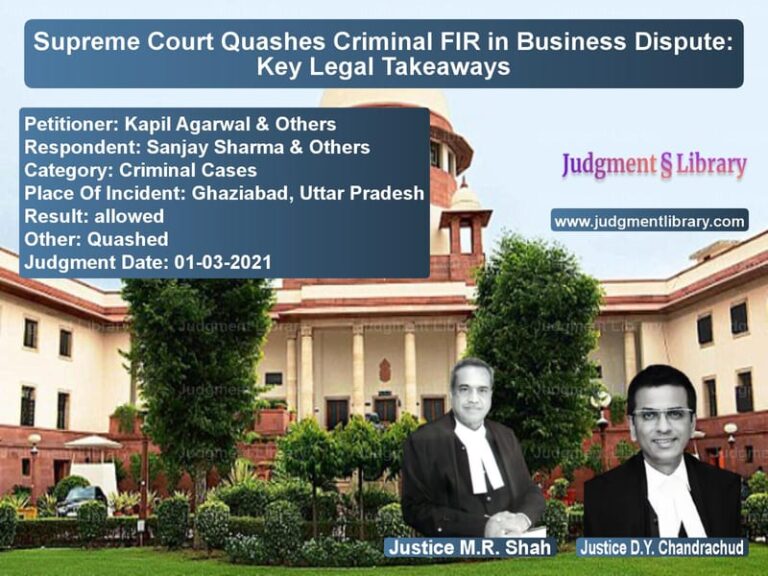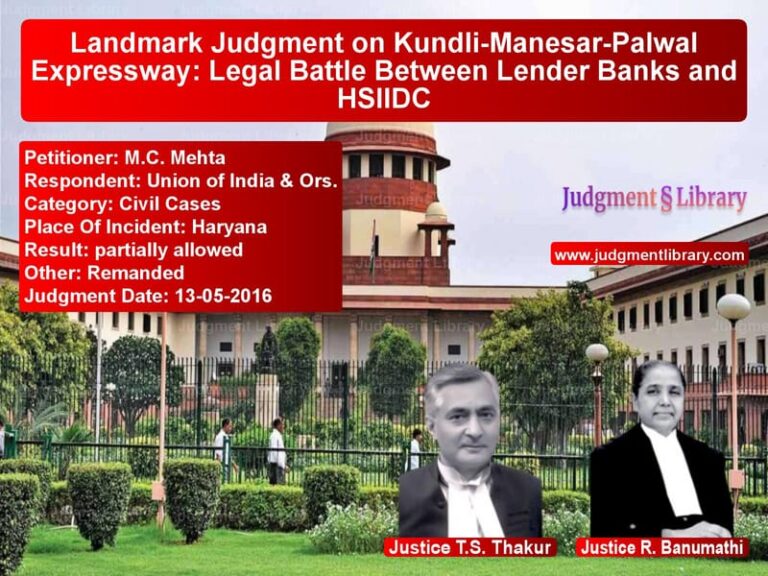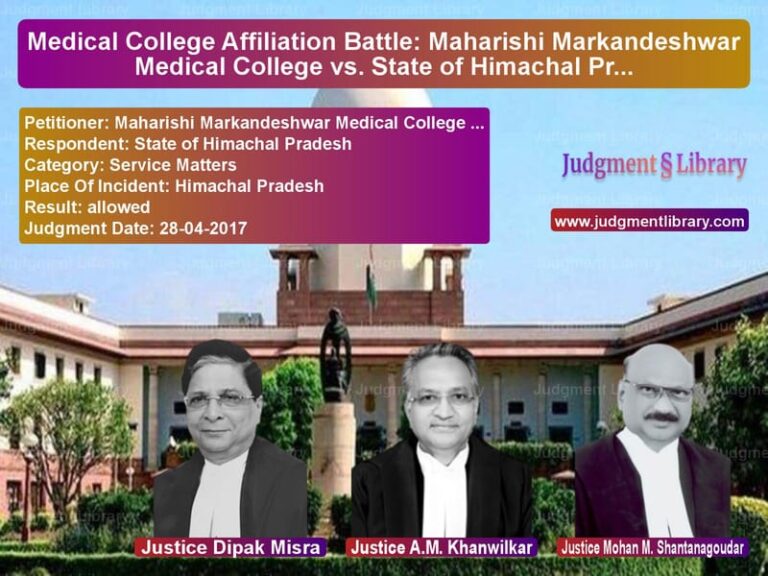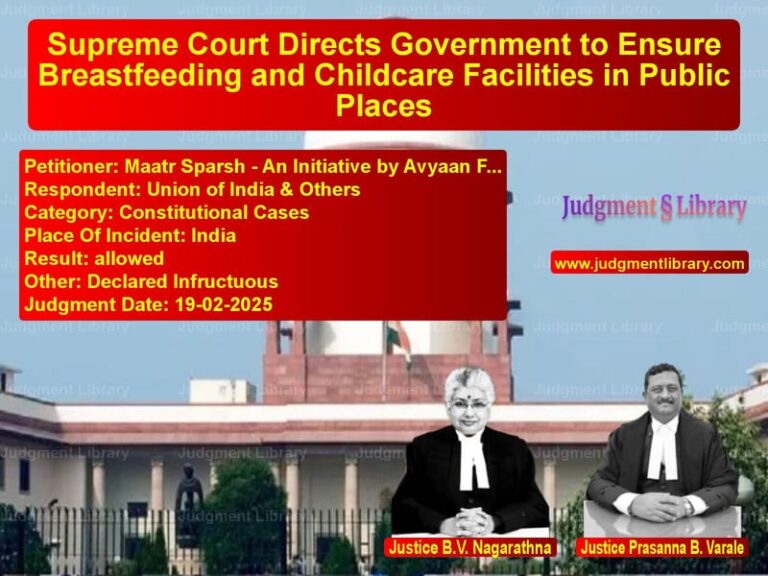Supreme Court Restores Land Rights of Bhoomidars in Uttar Pradesh Forest Dispute
The case of Hari Prakash Shukla & Ors. v. State of Uttar Pradesh & Anr. revolves around a long-standing dispute over land rights in Uttar Pradesh, where the appellants claimed ownership as bhoomidars. The Supreme Court ruled in their favor, overturning the Allahabad High Court’s decision and reinstating the orders passed by the Forest Settlement Officer and Additional District Judge.
Background of the Case
The appellants, Hari Prakash Shukla and others, were in possession of land that had been granted to them under a permanent lease by the then zamindar in 1952. However, the land was later notified under the Forest Act, leading to an eviction drive.
Key Developments Leading to Litigation
- 1952: The appellants were granted permanent lease rights over the disputed land.
- 1986: The Supreme Court, in the case of Banwasi Seva Ashram v. State of Uttar Pradesh, ordered the establishment of a committee to adjudicate land claims.
- 1991: The Forest Settlement Officer ruled in favor of the appellants, recognizing their claims.
- 1991: The Additional District Judge dismissed an appeal filed by the Forest Department against the Forest Settlement Officer’s ruling.
- 2005: The Additional District Judge ordered the recording of the appellants as bhoomidars.
- 2013: The Allahabad High Court set aside all prior decisions and ordered the appellants’ eviction.
- 2023: The Supreme Court overturned the High Court’s order, restoring the appellants’ land rights.
Arguments Before the Supreme Court
Appellants’ Arguments
The appellants, through their counsel, contended:
- They had been in continuous possession of the land for decades and had rightful claims as bhoomidars.
- The Forest Settlement Officer had lawfully recognized their claims after hearing both sides.
- The High Court exceeded its jurisdiction by reappreciating evidence that had already been accepted by two lower courts.
- The Banwasi Seva Ashram judgment did not limit relief to only Scheduled Tribes and backward communities, but to all legitimate claimants.
Respondents’ Arguments (State of Uttar Pradesh)
The State and Forest Department countered:
- The land had been declared a reserved forest, and the appellants had no legal right to remain on it.
- The High Court acted within its powers by reconsidering the evidence.
- The appellants failed to prove their possession in accordance with the law.
Supreme Court’s Analysis and Judgment
A bench comprising Justices Krishna Murari and Ahsanuddin Amanullah ruled in favor of the appellants, emphasizing key legal principles regarding land rights and judicial review.
Key Observations of the Court
1. Banwasi Seva Ashram Judgment Grants a Right to Be Heard
“The Banwasi Seva Ashram judgment confers upon all land claimants the procedural right to be heard, and not a substantive right of possession.”
The Court clarified that the 1986 judgment ensured a fair hearing for all claimants, not just specific communities.
2. The High Court Exceeded Its Jurisdiction
“The High Court, while exercising its jurisdiction under Article 226 of the Constitution, could not have reappreciated the evidence.”
The Court ruled that the High Court had improperly reassessed evidence already confirmed by two lower courts.
3. The Appellants Had Established Possession
“The appellants had proved their possession over the land through legally admissible evidence.”
The Supreme Court found no basis for rejecting the appellants’ claims.
4. Judicial Precedent Against Reappreciation of Evidence
The Court cited previous rulings:
- B.K. Muniraju v. State of Karnataka (2008): High Courts should not reappreciate evidence in writ jurisdiction.
- Krishnanand v. Director of Consolidation (2015): Findings of lower courts can only be set aside if they are perverse or beyond jurisdiction.
Final Verdict
The Supreme Court allowed the appeals, stating:
“The impugned order and judgment passed by the High Court of Allahabad dated 04.02.2013 is set aside. The orders passed by the Forest Settlement Officer and Additional District Judge are hereby confirmed.”
The appellants were reinstated as bhoomidars, and the eviction order was quashed.
Impact of the Judgment
This ruling has several legal implications:
- Reinforces land rights: Recognizes the legitimacy of historical possession claims.
- Limits judicial overreach: High Courts cannot reappreciate evidence unless findings are perverse.
- Clarifies Banwasi Seva Ashram ruling: Ensures all claimants have a right to be heard.
- Protects against arbitrary eviction: Landholders cannot be removed without due process.
Conclusion
The Supreme Court’s decision in Hari Prakash Shukla v. State of Uttar Pradesh reaffirms the importance of procedural fairness and land rights. By setting aside the High Court’s ruling, the judgment ensures that legitimate landowners are not arbitrarily evicted and that judicial interventions respect prior findings of lower courts.
Petitioner Name: Hari Prakash Shukla & Ors..Respondent Name: State of Uttar Pradesh & Anr..Judgment By: Justice Krishna Murari, Justice Ahsanuddin Amanullah.Place Of Incident: Uttar Pradesh.Judgment Date: 04-07-2023.
Don’t miss out on the full details! Download the complete judgment in PDF format below and gain valuable insights instantly!
Download Judgment: hari-prakash-shukla-vs-state-of-uttar-prade-supreme-court-of-india-judgment-dated-04-07-2023.pdf
Directly Download Judgment: Directly download this Judgment
See all petitions in Property Disputes
See all petitions in Landlord-Tenant Disputes
See all petitions in Damages and Compensation
See all petitions in Judgment by Krishna Murari
See all petitions in Judgment by Ahsanuddin Amanullah
See all petitions in allowed
See all petitions in Quashed
See all petitions in supreme court of India judgments July 2023
See all petitions in 2023 judgments
See all posts in Civil Cases Category
See all allowed petitions in Civil Cases Category
See all Dismissed petitions in Civil Cases Category
See all partially allowed petitions in Civil Cases Category







